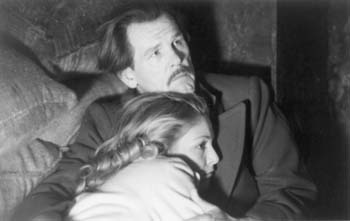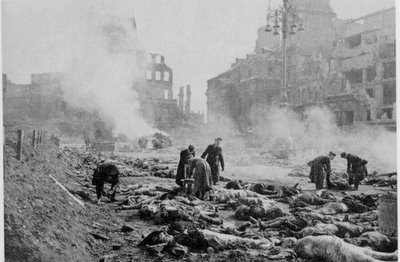
Let me apologize right away: I'm going to write about Kurt Vonnegut, Jr., which invariably makes me echo his style, badly, no matter how much I try not to. I find him the most seductive stylist, next to Raymond Chandler, of the twentieth century. Already I can feel my sentences getting shorter, my thoughts cluttered--then clearer, back and forth. This may be a good thing. I'm not sure yet. (See?) I better get started:
I watched Mother Night (1996) again, based on Vonnegut's 1962 novel, and directed by Keith Gordon; I will always remember him fondly as Arnie Cunningham, the nerd who's turned into an evil hood in John Carpenter's version of Stephen King's novel, Christine, which makes Gordon the anti-Richie Cunningham (same last name!); like Ron Howard, an actor-turned-director, except Gordon got to be both Richie AND Fonzie in the same movie. Anyway, seeing Mother Night made me think about Breakfast of Champions, which I read when I was a senior in high school, in 1973. I still have it; in fact, it's in front of me right now, propped up by a book-holder I've had since I was a little kid. I was looking for the passage where Vonnegut asserts that one day we will realize all our problems are caused by bad chemicals. But it isn't in this book--at least, not where I was looking, in the Preface. Instead, he discusses syphilis and goiters and sleeping pills, and says something close to what I was looking for: "[I]t is a big temptation with me, when I create a character for a novel, to say that he is what he is because of faulty wiring, or because of microscopic amounts of chemicals which he ate or failed to eat on that particular day." It's a great Preface, apologetic and humble--in other words, carte blanche to behave in his typically abominable, beautiful, humane, sorrowful, scabrous, hilarious, profane--and sacred--way; as he also asserts in the Preface, "I don't want to throw away any sacred things." (I am pleased to be reminded that he offers a short list: Armistice Day, Romeo and Juliet, and "all music." Good picks.)
 I cannot stop loving Vonnegut's books. I have been urging my teenagers to read him, and in order; if you've read Vonnegut, you know how he would intertwine characters and storylines, novel to novel--until Breakfast of Champions, in which he says, "I think I am trying to clear my head of all the junk in there." This seems to include Kilgore Trout, his science fiction writer--whose fiction actually appeared in The Magazine of Fantasy and Science Fiction--I know I have a copy of it boxed up somewhere--and a novel, I think. The writer was Philip Jose Farmer--still plugging along, according to the internet, just down the road from me in Peoria. The web also reminded me that Farmer's use of Trout's name caused problems; Vonnegut put a stop to it. You'd think Midwestern neighbors would get along better. So it goes. (Sorry.) Anyway, despite my better judgment, Vonnegut remains dear to me. I had read him when you're supposed to, in high school and college, and he has left a lasting impression, for which I am both grateful and anxious--a combination that I think would please Vonnegut.
I cannot stop loving Vonnegut's books. I have been urging my teenagers to read him, and in order; if you've read Vonnegut, you know how he would intertwine characters and storylines, novel to novel--until Breakfast of Champions, in which he says, "I think I am trying to clear my head of all the junk in there." This seems to include Kilgore Trout, his science fiction writer--whose fiction actually appeared in The Magazine of Fantasy and Science Fiction--I know I have a copy of it boxed up somewhere--and a novel, I think. The writer was Philip Jose Farmer--still plugging along, according to the internet, just down the road from me in Peoria. The web also reminded me that Farmer's use of Trout's name caused problems; Vonnegut put a stop to it. You'd think Midwestern neighbors would get along better. So it goes. (Sorry.) Anyway, despite my better judgment, Vonnegut remains dear to me. I had read him when you're supposed to, in high school and college, and he has left a lasting impression, for which I am both grateful and anxious--a combination that I think would please Vonnegut.I don't know Vonnegut's opinion of the movie version of Mother Night, but I think the movie was smart to have Vonnegut's protagonist, the Allied-spy-as-Nazi-propagandist, Howard W. Campbell, Jr. (Nick Nolte) narrate the film (and by the way, doesn't that name have an SF ring to it, part Robert E. (Conan the Barbarian) Howard, part John W. (Astounding magazine) Campbell?); Nolte captures the weary ironies of the tale, its wry, detached humor. It is a sad story, and Campbell's famous tagline, "You must be careful what you pretend to be, because in the end you are who you're pretending to be," is one of those statements so simple it reverberates like hammers and anvils. It reminds me of George Orwell's "Shooting an Elephant"--if you've never read it, do so. Now. Go on; nothing I'm ever going to write will be as important--in which he warns us of the hazards of Empire-building: "[W]hen the white man turns tyrant it is his own freedom that he destroys." And then the great, chilling line: "He wears a mask, and his face grows to fit it." Campbell is such a man, eager to display his talent, blade-running between undercover heroism and Nazi terrorism. And of course he becomes what he has pretended to be; his face grows to fit the mask.
I have been meaning to watch the movie Onibaba for two months. It, too, plays with the idea of masks, and features a horror-movie literalization of the dangers of donning one. Now might be the time to watch it, after seeing Howard Campbell shuffle along the streets of New York toward immobility, and telling us, "What froze me was the fact that I had absolutely no reason to move in any direction." In Breakfast of Champions, Vonnegut echoes this entropic doom: "I have no culture, no humane harmony in my brains. I can't live without a culture anymore." Again, reading those words in 1973 summed up the fear that swooped toward me, nose-to-nose, in those days--and still hangs at my back, waiting for me to put on a mask--or maybe forget I'm wearing one, and become what I've been pretending to be.
 Oh, I hope not. I'm just one year younger than Vonnegut when he wrote Breakfast of Champions, but I think I'm closer to some measure of reconciliation with the minor losses of my comfortable life than he was with those of his messy, mournful one, let alone the lives he conjures in his stories. At least I didn't have to hear the giants walking around up there while hiding in slaughterhouse-five, or spew anti-semitism in the name of Allied victory. Etc.
Oh, I hope not. I'm just one year younger than Vonnegut when he wrote Breakfast of Champions, but I think I'm closer to some measure of reconciliation with the minor losses of my comfortable life than he was with those of his messy, mournful one, let alone the lives he conjures in his stories. At least I didn't have to hear the giants walking around up there while hiding in slaughterhouse-five, or spew anti-semitism in the name of Allied victory. Etc.
No comments:
Post a Comment